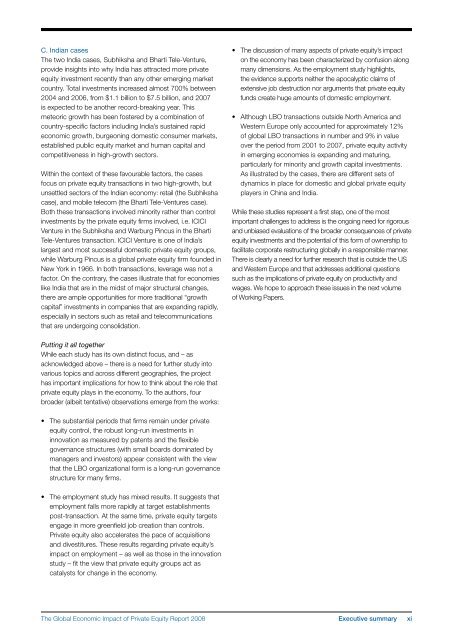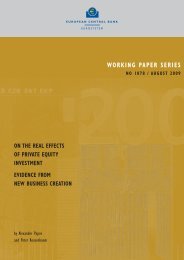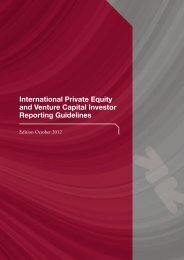The Global Economic Impact of Private Equity Report 2008 - World ...
The Global Economic Impact of Private Equity Report 2008 - World ...
The Global Economic Impact of Private Equity Report 2008 - World ...
- No tags were found...
You also want an ePaper? Increase the reach of your titles
YUMPU automatically turns print PDFs into web optimized ePapers that Google loves.
C. Indian cases<strong>The</strong> two India cases, Subhiksha and Bharti Tele-Venture,provide insights into why India has attracted more privateequity investment recently than any other emerging marketcountry. Total investments increased almost 700% between2004 and 2006, from $1.1 billion to $7.5 billion, and 2007is expected to be another record-breaking year. Thismeteoric growth has been fostered by a combination <strong>of</strong>country-specific factors including India’s sustained rapideconomic growth, burgeoning domestic consumer markets,established public equity market and human capital andcompetitiveness in high-growth sectors.Within the context <strong>of</strong> these favourable factors, the casesfocus on private equity transactions in two high-growth, butunsettled sectors <strong>of</strong> the Indian economy: retail (the Subhikshacase), and mobile telecom (the Bharti Tele‐Ventures case).Both these transactions involved minority rather than controlinvestments by the private equity firms involved, i.e. ICICIVenture in the Subhiksha and Warburg Pincus in the BhartiTele-Ventures transaction. ICICI Venture is one <strong>of</strong> India’slargest and most successful domestic private equity groups,while Warburg Pincus is a global private equity firm founded inNew York in 1966. In both transactions, leverage was not afactor. On the contrary, the cases illustrate that for economieslike India that are in the midst <strong>of</strong> major structural changes,there are ample opportunities for more traditional “growthcapital” investments in companies that are expanding rapidly,especially in sectors such as retail and telecommunicationsthat are undergoing consolidation.• <strong>The</strong> discussion <strong>of</strong> many aspects <strong>of</strong> private equity’s impacton the economy has been characterized by confusion alongmany dimensions. As the employment study highlights,the evidence supports neither the apocalyptic claims <strong>of</strong>extensive job destruction nor arguments that private equityfunds create huge amounts <strong>of</strong> domestic employment.• Although LBO transactions outside North America andWestern Europe only accounted for approximately 12%<strong>of</strong> global LBO transactions in number and 9% in valueover the period from 2001 to 2007, private equity activityin emerging economies is expanding and maturing,particularly for minority and growth capital investments.As illustrated by the cases, there are different sets <strong>of</strong>dynamics in place for domestic and global private equityplayers in China and India.While these studies represent a first step, one <strong>of</strong> the mostimportant challenges to address is the ongoing need for rigorousand unbiased evaluations <strong>of</strong> the broader consequences <strong>of</strong> privateequity investments and the potential <strong>of</strong> this form <strong>of</strong> ownership t<strong>of</strong>acilitate corporate restructuring globally in a responsible manner.<strong>The</strong>re is clearly a need for further research that is outside the USand Western Europe and that addresses additional questionssuch as the implications <strong>of</strong> private equity on productivity andwages. We hope to approach these issues in the next volume<strong>of</strong> Working Papers.Putting it all togetherWhile each study has its own distinct focus, and – asacknowledged above – there is a need for further study intovarious topics and across different geographies, the projecthas important implications for how to think about the role thatprivate equity plays in the economy. To the authors, fourbroader (albeit tentative) observations emerge from the works:• <strong>The</strong> substantial periods that firms remain under privateequity control, the robust long-run investments ininnovation as measured by patents and the flexiblegovernance structures (with small boards dominated bymanagers and investors) appear consistent with the viewthat the LBO organizational form is a long-run governancestructure for many firms.• <strong>The</strong> employment study has mixed results. It suggests thatemployment falls more rapidly at target establishmentspost-transaction. At the same time, private equity targetsengage in more greenfield job creation than controls.<strong>Private</strong> equity also accelerates the pace <strong>of</strong> acquisitionsand divestitures. <strong>The</strong>se results regarding private equity’simpact on employment – as well as those in the innovationstudy – fit the view that private equity groups act ascatalysts for change in the economy.<strong>The</strong> <strong>Global</strong> <strong>Economic</strong> <strong>Impact</strong> <strong>of</strong> <strong>Private</strong> <strong>Equity</strong> <strong>Report</strong> <strong>2008</strong>Executive summaryxi















